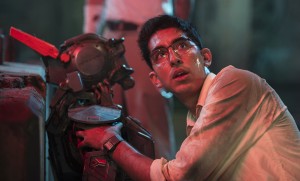“Chappie,” is the true successor to Neill Blomkamp’s directorial debut, “District 9.” Everything from the live action news shots to the realism of the characters made it remind us what we loved about “District 9.” It allowed the viewer to relive that experience of entering Blomkamp’s dark and twisted, yet somehow familiar world.
“Chappie” is the story of three thieves living in Johannesburg, South Africa. The city has just seen the release of the world’s first robotic police force, created by young engineer Deon Wilson (Dev Patel). Wilson works under Michelle Bradley (Sigourney Weaver). When the three outlaws fail to pay up to the head crime boss, as their plan is foiled by this newly licensed police force, their best hope is a grand heist to “turn off the police.” After intercepting Deon, they are fooled into believing their only hope is to accept the help of his new program, which will create an artificial intelligence. For obvious reasons, these thugs’ ideals do not match with those of Deon, and while raising the young robot to understand this new world, many problems arise.
However, their main adversary is soon revealed to be Deon’s co-worker, Vincent Moore (Hugh Jackman), who is upset because his human controlled-robot destroyers, Moose, were overlooked for Deon’s superior design. Vincent decides the only way to get back at Deon is to put the city in a place where it needs his help.
The three criminals in charge of raising Chappie are Ninja, Yo-Landi and Amerika (Jose Pablo Cantillo). Ninja and Yo-Landi play themselves set years after the fall of their rap group, Die Antwoord (“The Answer”). Their acting abilities weren’t the strongest, but they didn’t really have to be; they had to play themselves — unlikable, rude, eccentric imbeciles. It’s a credit to the way it was shot and assembled that by the end I could find myself rallying for these characters that I really had no right to want to watch. Their innocence almost gave them pardon for tricking this young robot into a life of crime.
The film was truly amazing as for over two hours, the audience was captivated by a robot. Chappie shares more features with WALL-E than Sonny from “I, Robot,” and that is definitely a good thing. WALL-E is curious and lovable; he expresses himself in such a unique way it is hard to look away from him, whereas Sonny is more of an android made to look like a human, taking that extra level of nonhuman expression away from the character. Chappie is given the near-impossible task of conveying human emotions in a very inhuman way. He expresses himself with his two antennae, like a dog’s ears, and a bar where his mouth and eye brows would be. The decisions made on how to make Chappie feel alive are what make this movie so memorable. You can feel yourself wanting to protect Chappie like you want to protect a child.
At one point in the movie, I remember taking in a swift breath in while watching someone attempt to take off Chappie’s arm. Mind you, this robot felt nothing, but it was able to make the audience feel something.
Dev Patel is a very talented actor, as best noted by his work in the 2008 motion picture “Slumdog Millionaire.” Patel felt so incredibly invested in this robot that it helps the audience suspend disbelief and gives them a real reason to rally for Chappie. So, maybe choosing to focus a movie around a rap group with no acting experience rather than Patel was a bit of a misfire on behalf of Blomkamp.
Finally, Blomkamp’s consistent ability to immerse an audience and make them believe the spectacular is reality is once again on display as he continues to pump out a gritty naturalistic style of film. What makes “District 9” so memorable is that it feels like something that actually happened. As described by Blomkamp in an interview on IGN’s U.K. Podcast, to make people believe the unbelievable, you have to give them something familiar and then blur that line. This explains his choice in casting Die Antwoord a few years after their music career — because it isn’t acting; it’s believable that these two would become criminals and wear their own merchandise because it’s all they have left.
Beyond that Hugh Jackman’s character Vincent even has an Australian background and a thick accent. But to blur the audience’s perception Blomkamp gave Jackman a horrid mullet and made his character borderline psychotic.
Neill Blomkamp, regardless of what most may say, is an artist. With the exception of Wes Anderson, no one does world-building quiet like he does. His filmography brings realism to a film without ever feeling forcefully stylized and drawing away from the story.
“Chappie” has opened to an expected $13 million; however, this movie will suffer from the recent news that Blomkamp will be helming the next film in the “Alien” franchise. Most attention and momentum, for better or worse, has been shifted to Blomkamp’s next project. It doesn’t appear as though “Chappie,” a movie that felt more like the “Robocop” sequel we deserved than the actual “Robocop,” will ever receive quite the recognition it deserves.
The post Blomkamp’s ‘Chappie’ fails to deliver on neat concept appeared first on The Triangle.

